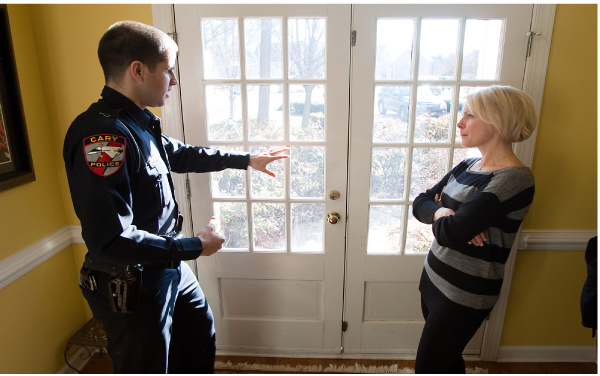You make sure your doors are locked before bed, turn on your alarm system and keep a lookout for suspicious behavior. You feel safe. But could you be safer?
A program offered by the Cary Police Department hopes to prove you can.
In a free service offered by the police, an expert in crime prevention will come out to your home or business to perform a walk-through. The goal is to point out any potential weak points in your home’s security, as well as offer suggestions for simple, inexpensive ways to harden your home’s defenses.
The basis for the program’s methodology comes from a concept called Crime Prevention through Environmental Design, or CPTED. Each change recommended will serve to deny, deter, delay or detect potential intrusion efforts.
Community Services Officer Brian Austin describes what he calls the “crime prevention triangle.” For a crime to occur, three things are necessary: the criminal’s desire to commit the act, the skills or ability to do so, and an opportunity to do so. “If we can take away one side of this triangle, the crime never occurs,” Austin said. CPTED precautions aim to remove the opportunity.
Some of what the evaluation recommends is common sense: Window coverings keep potential thieves from seeing easy targets. Five-pin door locks are better than three-pin because they are harder to pick. However, the program aims to point out areas for improvement that many homeowners may not know about or consider important.
Cary homeowner Aimee McIntyre lives in a prestigious neighborhood, but she knows from experience that crime can happen to anyone. Several years ago, her family fell victim to a small case of theft.
“We left our garage door open. My husband left to go golfing and I was getting ready to go running,” she recalled. “It was a five-minute window. I came outside and dropped the garage door. He came home and the lawnmower was gone.”
Even since that incident, McIntyre believes her home is secure. “I think it’s a mindset of if you’re smart — lock your house, lock your car — you feel very safe,” she said.
Austin and crime prevention specialist Bob Poisella met McIntyre at her home to review its current security level and teach her ways to reduce the likelihood of being targeted again.
The experts agreed that the most common method of entry seen in area home robberies is the burglar kicking in the door. With enough force, even the best deadbolt can be easily ripped out of the door frame. Poisella recommended a high-security strike plate for the door jamb to reinforce the wooden frame. Another reinforcement could be added around the deadbolt itself to keep the door from splintering.
“It takes me about three kicks, usually,” Poisella said, referencing McIntyre’s wooden front door. “With this (strike plate) it would take about 15 kicks.” A potential robber would likely decide to flee after a few failed attempts, he said.
The recommended additions are not labor-intensive or expensive, so even busy or budget-conscious homeowners can benefit from the advice. “Most of the recommendations we make are cheap. We try to be conscious about the cost,” Austin noted. The average homeowner probably spends around $20 to $50 after an evaluation for recommended supplies and hardware.
Some of the tips are even free. “You can get your mail canceled while on vacation, but that doesn’t stop the landscape guy from hanging something (on your mailbox), or the pizza guy from hanging something,” Austin pointed out.
Small details like a hang tag staying in place for a few days, a trash can out by the curb when others on the street have been put away, or even a lack of interior lights being turned on regularly all single out a home as an easy target. “Have a trusted neighbor check your mail, and while they’re there, have them walk around your house,” tidying up and looking for any signs of disturbance, he advised.
Dogs can serve as “biological alarms,” according to Austin, but homeowners don’t even need to adopt a four-legged friend to take advantage of their protection. “I suggest that people get a tape recording of a dog. You could even be sophisticated enough to rig that up to some kind of sensor” to discourage any foul play, Poisella noted.
Window pins, charley bars, thorny bushes, motion detector lighting and even polycarbonate film can all play a role in increasing home security when utilized correctly. The key, according to Austin, is integrating as many small measures as possible to reduce the likelihood of your home being victimized. “You’ve got to do a little of everything,” he believes.
Tips vary depending on the type of building, its surroundings, landscaping and layout. The officers cater each visit to the unique traits of the home being screened. To schedule an evaluation for your Cary home or business, contact Austin at (919) 469-4324 or e-mail brian.austin@townofcary.org.






